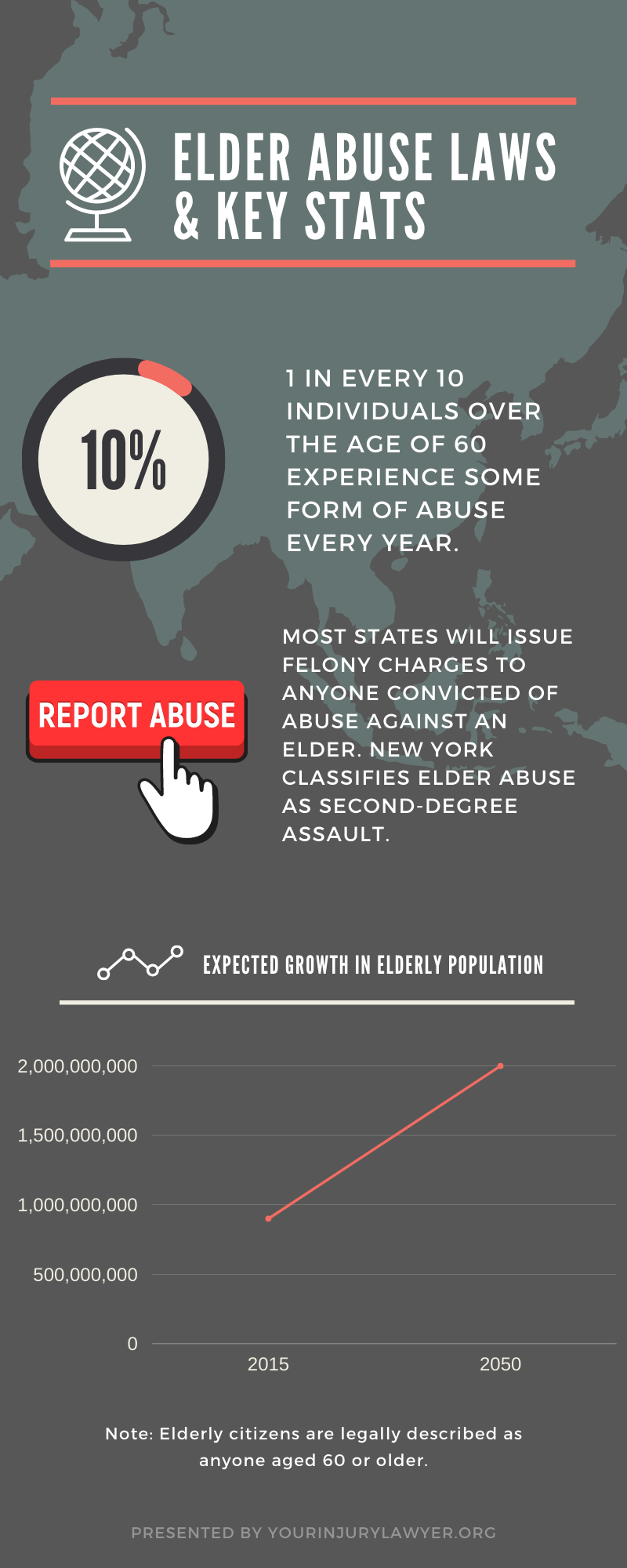
Abuse is a widespread problem in nursing homes and other nursing facilities across the United States.
1 in every 10 individuals over the age of 60 experience some form of abuse every year.
According to the World Health Organization, 2 out of every 3 staff members admit to committing abusive acts.
And these already disturbing trends could potentially get worse in the near future.

In 2015, 900 million people around the world were legally classified as senior citizens. By 2050, experts believe that number will rise to 2 billion.
Elder abuse laws are more important now than ever before.
Not only will they protect the current population of senior citizens…
Aoinform.Com/News/Kak_Realno_Povysit_Potenciju/2019-11-24-33733/
But hopefully prevent the growing elderly population from suffering a similar fate.
Page Contents:
Elder abuse is classified as any intentional action, or lack of action, which poses harm to an elder.
Abuse comes in many forms, including the following:
Elder abuse leaves lasting trauma on those unfortunate enough to be subjected to it. Many victims choose not to speak about their experiences, out of fear that they will suffer further if they report the mistreatment.
Physical injuries can range from cuts and bruises to permanent disabilities. Tragically, many cases result in the untimely death of the victim, devastating any family and friends who try to help.
Every state has its own set of laws and penalties put in place to protect the elderly. While the charges for elder abuse vary from state to state, other procedures are consistent throughout the country.
This carries a prison sentence of 2 to 7 years.
(Provided that the assailant is at least 10 years younger than the victim.)

In some areas, the sentencing can range between a Class A misdemeanor and a Class C felony depending on the severity of the abuse. States who follow this system include Connecticut, Wisconsin and Illinois.
Click here to learn the criminal penalties for elder abuse by state.
In the United States, mandatory reporting is the practice of reporting instances of abuse committed upon a vulnerable group, such as the elderly.
Each state has different definitions of who is legally required to be a mandated report. Typically, mandated reporters are those who frequently live or work with elders.
Such as:
Other states require all citizens to report any cases of abuse. Alabama, for instance, extends mandated reporting to law enforcement, clergy members, and select state employees.
Arizona requires accountants and attorneys to also report any suspected abuse toward their clients.

Mandated reporters are required by law to report signs of abuse within 24 to 48 hours of being made aware of the neglect. Failure to comply results in the individual being charged with a felony misdemeanor.
Click here to learn more about mandated reporting laws by state.
Financial abuse occurs when an elderly citizen’s finances are misappropriated by another individual, usually someone who has a close relationship with the elder.
This type of abuse takes a variety of forms. It can range from stealing money out of the senior’s bank account (overlapping with forging a signature) to preying upon the elderly and scamming them.
(The infamous Nigerian Prince Scam, legally classified as a 419 scam, is a well-known form of fraud targeting the elderly.)
What makes financial abuse so difficult to challenge is that it often requires the unwitting consent of the victim. A senior citizen might trust their caregiver with managing their finances, unaware that their bank account is in danger.
And it can happen to anyone regardless of wealth.
Keya Morgan, the manager of late Marvel Comics creator Stan Lee, was recently charged with financial abuse after pocketing $260,000 of Lee’s money prior to his death in 2018.
As mentioned earlier, each state has its own set of laws and statutes related to abuse against the elderly, including financial abuse.
Most of these overlap with mandatory reporting laws, but also include the formation of task forces designed to monitor cases of financial abuse.
Unlike other instances of elder abuse…
It’s very rare for a case of financial abuse to be brought to criminal court. The victim’s relatives just want the elder’s assets restored without the need for a lengthy court case.
(And if the abuser is another relative or a close family friend, the elder’s family might not want to see them sentenced despite the massive breach of trust committed.)

If criminal charges are filed, financial abuse can result in a maximum of 4 years in prison and a fine of $10,000.
In some states, the law can allow for someone to be disinherited if they are convicted of financial abuse. In California, Probate Code section 259 declares a financial abuser as predeceasing the elder and effectively cutting them out of the will.
(This is regardless of the fact that the abuser is likely still alive at the time of sentencing.)
Legally speaking…
They are dead in this scenario and ineligible to claim any inheritance.
Click here to learn about the laws and regulations on financial abuse in each state.
Elder abuse is startlingly common in the United States. 1 in every 10 elders experiences abuse, yet only 1 in every 14 cases is ever reported.
To combat the increasing cases, Congress has passed several articles of legislation with the intent of offering further protection to seniors.
The Elder Justice Act was enacted in 2010 as part of the Patient Protection & Affordable Care Act (PPACA). It established the Elder Justice Coordinating Council and Advisory Board, which oversee cases of elder abuse.
It also authorized funding for long-term improvement plans, training in both federal and state nursing facilities, and required data exchanges between facilities.
It also reinforced existing mandated reporting laws.
(As of this writing, however, Congress has never actually appropriated any funds for the programs included in the Elder Justice Act.)

The Older Americans Act was passed in 1965, originally as a means of organizing community programs for the elderly. The act was amended in 2006 to protect seniors from neglect, and every reauthorization of the act since then has been committed to this purpose.
The revised act establishes a network across nursing facilities to ensure all residents receive the proper care. It also promises plans to work toward a specialized “elder justice system” in the United States, with the intent of preventing future instances of abuse from happening.
The Elder Abuse Prevention and Prosecution Act of 2017 grants the Department of Justice the authority to collect a database of elder abuse cases, primarily those which involve scams or other instances of financial fraud.
While the laws mentioned above are designed to protect the elderly, countless cases of abuse and neglect go unreported every year.
If you or a loved one is suffering from elder abuse, it’s time to take a stand.
We will help put you in contact with a licensed attorney specializing in elder abuse cases. From there, they will fight for any financial compensation you may be eligible for.
Please call us at (855) 344-1017, or submit your case here. The consultation is 100% free, and there are no fees unless you win your case.